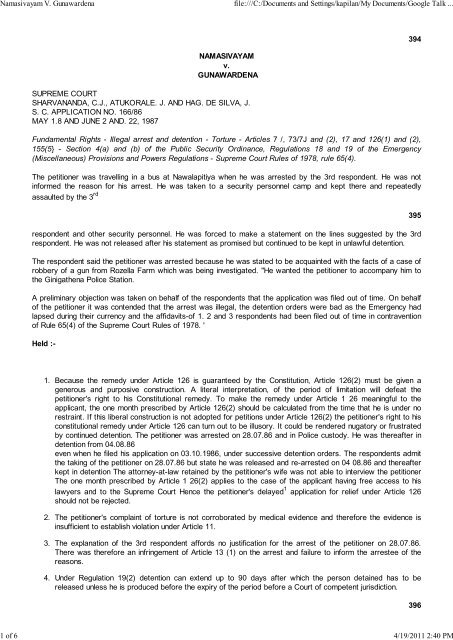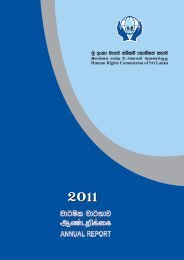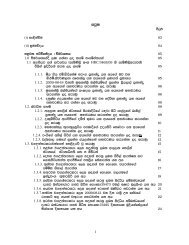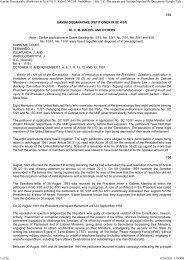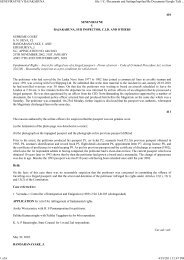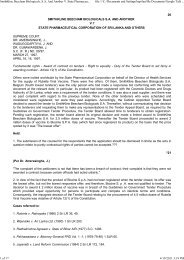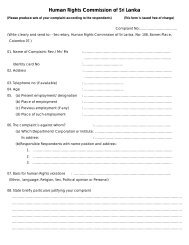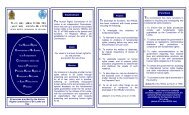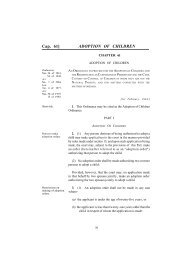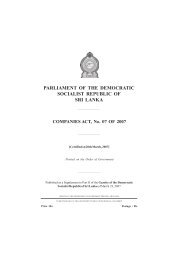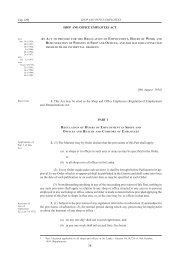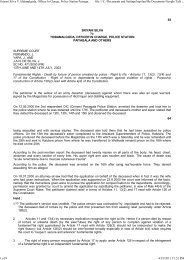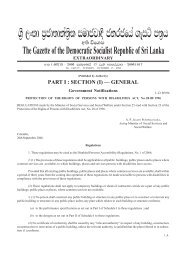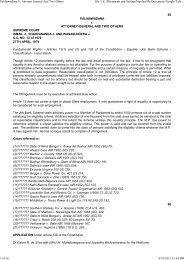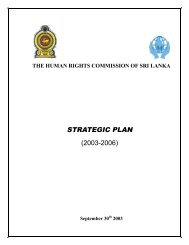Namasivayam V. Gunawardena
Namasivayam V. Gunawardena
Namasivayam V. Gunawardena
Create successful ePaper yourself
Turn your PDF publications into a flip-book with our unique Google optimized e-Paper software.
<strong>Namasivayam</strong> V. <strong>Gunawardena</strong> file:///C:/Documents and Settings/kapilan/My Documents/Google Talk ...<br />
NAMASIVAYAM<br />
v.<br />
GUNAWARDENA<br />
SUPREME COURT<br />
SHARVANANDA, C.J., ATUKORALE. J. AND HAG. DE SILVA, J.<br />
S. C. APPLICATION NO. 166/86<br />
MAY 1.8 AND JUNE 2 AND. 22, 1987<br />
Fundamental Rights - Illegal arrest and detention - Torture - Articles 7 /, 73/7J and (2), 17 and 126(1) and (2),<br />
155(5} - Section 4(a) and (b) of the Public Security Ordinance, Regulations 18 and 19 of the Emergency<br />
(Miscellaneous) Provisions and Powers Regulations - Supreme Court Rules of 1978, rule 65(4).<br />
The petitioner was travelling in a bus at Nawalapitiya when he was arrested by the 3rd respondent. He was not<br />
informed the reason for his arrest. He was taken to a security personnel camp and kept there and repeatedly<br />
assaulted by the 3 rd<br />
respondent and other security personnel. He was forced to make a statement on the lines suggested by the 3rd<br />
respondent. He was not released after his statement as promised but continued to be kept in unlawful detention.<br />
The respondent said the petitioner was arrested because he was stated to be acquainted with the facts of a case of<br />
robbery of a gun from Rozella Farm which was being investigated. "He wanted the petitioner to accompany him to<br />
the Ginigathena Police Station.<br />
A preliminary objection was taken on behalf of the respondents that the application was filed out of time. On behalf<br />
of the petitioner it was contended that the arrest was illegal, the detention orders were bad as the Emergency had<br />
lapsed during their currency and the affidavits-of 1. 2 and 3 respondents had been filed out of time in contravention<br />
of Rule 65(4) of the Supreme Court Rules of 1978. '<br />
Held :-<br />
1.<br />
2.<br />
3.<br />
4.<br />
Because the remedy under Article 126 is guaranteed by the Constitution, Article 126(2) must be given a<br />
generous and purposive construction. A literal interpretation, of the period of limitation will defeat the<br />
petitioner's right to his Constitutional remedy. To make the remedy under Article 1 26 meaningful to the<br />
applicant, the one month prescribed by Article 126(2) should be calculated from the time that he is under no<br />
restraint. If this liberal construction is not adopted for petitions under Article 126(2) the petitioner's right to his<br />
constitutional remedy under Article 126 can turn out to be illusory. It could be rendered nugatory or frustrated<br />
by continued detention. The petitioner was arrested on 28.07.86 and in Police custody. He was thereafter in<br />
detention from 04.08.86<br />
even when he filed his application on 03.10.1986, under successive detention orders. The respondents admit<br />
the taking of the petitioner on 28.07.86 but state he was released and re-arrested on 04 08.86 and thereafter<br />
kept in detention The attorney-at-law retained by the petitioner's wife was not able to interview the petitioner<br />
The one month prescribed by Article 1 26(2) applies to the case of the applicant having free access to his<br />
lawyers and to the Supreme Court Hence the petitioner's delayed 1 application for relief under Article 126<br />
should not be rejected.<br />
The petitioner's complaint of torture is not corroborated by medical evidence and therefore the evidence is<br />
insufficient to establish violation under Article 11.<br />
The explanation of the 3rd respondent affords no justification for the arrest of the petitioner on 28.07.86.<br />
There was therefore an infringement of Article 13 (1) on the arrest and failure to inform the arrestee of the<br />
reasons.<br />
Under Regulation 19(2) detention can extend up to 90 days after which the person detained has to be<br />
released unless he is produced before the expiry of the period before a Court of competent jurisdiction.<br />
1 of 6 4/19/2011 2:40 PM<br />
394<br />
395<br />
396
<strong>Namasivayam</strong> V. <strong>Gunawardena</strong> file:///C:/Documents and Settings/kapilan/My Documents/Google Talk ...<br />
(5) Under Regulation 19(2), Article 1 55(5) and section 4{a) & (b) of the Public Security Ordinance read together, the<br />
validity of a detention order made under a Regulation since lapsed is kept alive. The expiry of the Emergency<br />
Regulations does not affect the detention order under which the petitioner was held.<br />
(6), The 1.2.3 respondents filed their objections after the 7 days from date of service of a notice as stipulated by<br />
Rule 65(4) of-.the Supreme Court Rules 1978 but the Chief Justice had granted them an extension on an application<br />
made by them.<br />
The Chief Justice here exercised a discretion founded on the inherent right of the Supreme Court to do justice As a<br />
matter of administrative arrangement the Chief Justice deals with applications for extended time Affidavits and<br />
objections filed within such extended time could be admitted.<br />
Application for infringement of Fundamental Rights under Articles 11, 13(1) and (2),<br />
Jayampathy Wickremaratne with M. S. M. Suhaid, M. H M Salman and Hemasiri Withanachchi for Petitioner.<br />
Nihal jayasinghe SSC for Attorney‑General.<br />
Petitioner present in person produced from Remand Prison.<br />
September 9, 1987<br />
SHARVANANDA, C.J.<br />
Cur. adv. vult<br />
By his petition dated 3 rd October 1986 the Petitioner complained to this Court that the fundamental rights<br />
guaranteed to him by Articles 11, 13 (1) and 13(2) had been violated by the Respondents.<br />
In this petition, the Petitioner has stated that: on 28.7.86 while he was travelling in a C.T.B. bus on his way<br />
to Nawalapitiya, he was arrested by Police Sgt. Najibdeen, the 3 rd Respondent; he was not informed the reason for<br />
his arrest, he was taken to a security personnel camp and kept there till 4 th August 1986 and during this period he<br />
was repeatedly assaulted by the 3 rd Respondent and other security personnel. He was told that he was a terrorist<br />
belonging to an organisation which they referred to as T.E.L.E. or Tamil Eelam Liberation Extremists; though he<br />
denied the allegation they continued to assault him until he<br />
agreed to make a statement on the lines suggested by the 3 rd Respondent. On 4.8.86 he was taken to the Police<br />
Station Hatton and produced before the 2 nd Respondent who was the Head Quarters Inspector of the Hatton Police;<br />
as he was unable to withstand any more physical assault and as he was promised that he would be released, he<br />
made a statement to the 2 nd Respondent on the lines suggested by the 3 rd Respondent. He was not released after<br />
his statement as promised; he was continued to be kept in unlawful detention. On 31.8.86 he was taken to the<br />
Gampola Police Station and kept there till 5.9.86. At Gampola Police he was compelled by threats to repeat to the<br />
A.S.P., Gampola the statement, that he had made earlier to the 2 nd Respondent. He made the statement because<br />
he feared that he would be subjected to assault by the 3 rd Respondent and other officers. On 5.9.86 he was taken<br />
back to Hatton Police Station and kept till 18.9.86. On 18.9.86 he was taken to the Hatton Magistrate and was<br />
remanded by him indefinitely.<br />
The Petitioner further complained that the Attorney‑at‑Law arranged by his wife to interview him was denied<br />
access to him by the 2 nd Respondent.<br />
The Respondents by their affidavits have denied the allegations made against them by the Petitioner. Police<br />
Sgt. Najimudeen, 3 rd Respondent, denied having arrested the petitioner on 28.7.86. He has stated that "on 28.7.86, I<br />
was investigating into a case of robbery of gun from Rosella Farm committed on 3.6.86. I had reason to believe that<br />
the Petitioner was acquainted with the facts and circumstances relating to the said robbery. I requested the<br />
Petitioner to accompany me to Ginigathena Police for questioning. At the Police Station he was questioned in<br />
connection with this case and was released immediately after his statement was recorded." The 3 rd Respondent<br />
further stated that subsequently he received information that the Petitioner was involved in acts which constituted<br />
2 of 6 4/19/2011 2:40 PM<br />
397
<strong>Namasivayam</strong> V. <strong>Gunawardena</strong> file:///C:/Documents and Settings/kapilan/My Documents/Google Talk ...<br />
offences under the Emergency (Miscellaneous) Provisions & Powers Regulations and that on 4.8.86, he arrested the<br />
Petitioner in terms of Regulation 18 at the Watawala Railway Station, that after having explained the charge against<br />
him he took the Petitioner to the Hatton Police Station, where he was questioned on the information he, had;<br />
that the Petitioner made a statement to the 2 nd Respondent in which he admitted that he was a member of the Tamil<br />
Eelam Liberation Extremists. The 3 rd Respondent has denied having made any inducement, threat or suggestion to<br />
the Petitioner to make the statement.<br />
The 3 rd Respondent further stated that on 5.8.86 the 1 st Respondent who is the Deputy Inspector General of<br />
Police, Kandy, made order authorising the detention of the Petitioner at the Hatton Police Station for 30 days from<br />
5.8.86, that the Petitioner was detained at the Hatton Police Station till 31 st August 1986 on which date he was taken<br />
to the Gampola Police Station, for the purpose of recording a statement by the A. S. P., Gampola. Recording of the<br />
statement continued from 31 .8.86 till 5.9.86. The Petitioner was taken back to Hatton Police Station on 5.9.86 and<br />
was produced before the Magistrate on 18.9.86 and was remanded by the Magistrate. The 3 rd Respondent denied<br />
having told Mr. Wickremaratne, Attorney‑at‑Law that he had instructions from the 2 nd Respondent not to permit any<br />
person to speak to the Petitioner. As the 2 nd Respondent was away at the time when Mr. Wickremaratne came to<br />
the Hatton Police Station, the Probationary Sub‑Inspector had asked him to obtain permission from the A.S.P.,<br />
Hatton to speak to the Petitioner. As Mr. Wickremaratne was unable to meet the A.S.P. he went away.<br />
The 1 st Respondent who is the Deputy Inspector General of Police, (Central Range) has filed affidavit<br />
stating that on 5.8.86 it was brought to his notice that the Petitioner had been arrested on suspicion of having<br />
committed an offence under the Emergency Regulations. He made order on 5.8.86 authorising the Hatton Police<br />
Station to be the place where the Petitioner should be detained till 4.9.86, and that subsequently on 4.9.86 he again<br />
made order that the Petitioner be kept at that place till 4.10.86.<br />
The 2 nd Respondent who is the Headquarters Inspector, Hatton Police Station has stated that on 4.8.86<br />
Petitioner was brought before him at the Hatton Police Station, that he voluntarily made a statement to him, wherein<br />
he admitted his involvement in the activities of the T.E.L.E., that the Petitioner was<br />
refused permission to the Attorney-at-Law to speak to the Petitioner.<br />
At the outset of the hearing Counsel for the Attorney-General raised a preliminary objection that the petition under<br />
Article 1 26 of the Constitution was filed out of time.<br />
Article 1 26 provides that an application to the Supreme Court praying for relief in respect of any infringement by<br />
executive or administrative action should be filed within one month of the alleged infringement. According to the<br />
Petitioner, he was unlawfully arrested on 28.7.86 and was in breach of Article 13(1) of the Constitution, not made<br />
aware of the reason for his arrest, and was unlawfully detained from that date.<br />
In my view, Article 1 26(2) postulates a person whose freedom of movement is not fettered by being kept in custody<br />
or detention, who has free access to the Supreme Court to apply for relief under Article 126 of the Constitution.<br />
According to the Petitioner from the date of his arrest on 28.7.86 to the time of the filing of the petition on 3.10.86 he<br />
was in detention. And hence he did not have free access to the Supreme Court or to his lawyer to be able to take<br />
proceedings within the one month stipulated by Article 126(2). Admittedly the Petitioner was in detention from 4.8.86<br />
to the date of his filing the present application.<br />
Counsel stated that even though he was not in a position to make his application, his wife could have, on his behalf,<br />
made the application within the time. According to the' Petitioner his wife was strictly enjoined by the Police not<br />
to-discuss with the Petitioner any matter pertaining to the detention and that he was not able to discuss anything with<br />
his wife, relating to his detention or arrest because of the presence of a Police Officer whenever his wife visited him.<br />
Further Mr. Wickremaratne,<br />
3 of 6 4/19/2011 2:40 PM<br />
398<br />
399
<strong>Namasivayam</strong> V. <strong>Gunawardena</strong> file:///C:/Documents and Settings/kapilan/My Documents/Google Talk ...<br />
Attorney-at-Law who was appointed by Petitioner's wife to interview the Petitioner was not able to have any<br />
conference with the Petitioner. In any event the Petitioner cannot suffer for the failure of his wife to take steps under<br />
Article 126 It cannot be gainsaid that his detention prevented him from taking proceedings within one month<br />
prescribed by Article 126. To make the remedy under Article 1 26 meaningful to the applicant, the one month<br />
prescribed by Article 1 26(2) should be calculated from the time that he is under no restraint. If this liberal<br />
construction is not adopted for Petitions under Article 1 26(2) the Petitioner's right to his constitutional remedy under<br />
Article 126 can turn out to be illusory. It could be rendered nugatory or frustrated by continued detention. According<br />
to the facts in this case, the Petitioner was unlawfully arrested, and was not informed of the reason for his arrest on<br />
28.7.86. The Respondents admit that the Petitioner has been in detention from 4\8.86 and continued to be in<br />
detention even on 3.10.1986 when he filed the present application. The Respondents admit the incident of 28.7:86,<br />
but state that he was re-arrested on 4.8.86 and thereafter kept in detention. Admittedly the Attorney-at-Law retained<br />
by Petitioner's wife was not able to interview the Petitioner, in the circumstances, the Petitioner was thwarted from<br />
filing his petition under Article 1 26, within one month in terms of that Article. A literal interpretation of the period of<br />
limitation will defeat the Petitioner's right to his constitutional remedy. It is significant that Article 1 7 which provides<br />
that every person shall be entitled to apply to the Supreme Court as provided by Article 1 26 in respect of the<br />
infringement by executive or administrative action of his fundamental right, is itself included in the Chapter on<br />
fundamental rights. Because the remedy under Article 126 is thus guaranteed by the Constitution, a duty is imposed<br />
upon the Supreme Court to protect fundamental rights and ensure their vindication. Hence Article 126(2) should be<br />
given a generous and purposive construction. The one month prescribed by Article 126(2) for making an application<br />
for relief by a person for infraction of his fundamental right applies to the case of the applicant having free access to<br />
his lawyer and to the Supreme Court. Hence, if the Petitioner was obstructed by reason of his detention from having<br />
access to his lawyer and to the Supreme Court and thus prevented from making his application within the<br />
one month of the infraction complained of; his delayed application for relief under Article 1 26 should not be ruled out,<br />
if he made his application as soon as he was free from that constraint to make the application.<br />
We therefore overruled the preliminary objection raised by State Counsel.<br />
On the question whether the petitioner was subject to cruel treatment or torture, petitioner's averments stands<br />
uncorroborated by any medical evidence and has been denied by the Respondents. The evidence is not sufficient for<br />
us to hold that there had been any violation of Article 11 of the Constitution.<br />
The Petitioner states that he was arrested on 28.7.86 when he was travelling in a bus, by the 3rd Respondent and<br />
that he was not informed of the reason of the arrest. The 3rd Respondent in his affidavit admitted the incident but<br />
stated that he did not arrest the petitioner. According to him he only required the petitioner to accompany him to the<br />
Ginigathena Police Station for questioning and released him after recording the statement at the station. If his action<br />
constituted an arrest in the legal sense, implicit in the 3rd Respondent's explanation is the admission that he did not<br />
give any reason to the Petitioner for his arrest. In my view when the 3rd Respondent required the Petitioner to<br />
accompany him to the Police Station and took him to the Police Station, the Petitioner was in law arrested by the 3rd<br />
Respondent. The Petitioner was prevented by the action of the 3rd Respondent from proceeding with his journey in<br />
the bus. The Petitioner was deprived of his liberty to go where he pleased. It was not necessary that there should<br />
have been any actual use of force; threat of force used to procure the Petitioner's submission was sufficient. The<br />
Petitioner did hot go to the Police Station Voluntarily. He was taken to the Police by the 3rd Respondent, in my view<br />
the 3rd Respondent's action of arresting the Petitioner and not informing him the reasons for his arrest violated the<br />
Petitioner's fundamental rights warranted by Article 1 3(1) of the Constitution. The liberty of an individual is a matter<br />
of great constitutional importance. This liberty should not be interfered<br />
with, whatever the status of that individual be, arbitrarily or without legal justification. The 3rd Respondent does not<br />
plead that he had any reasonable suspicion that the Petitioner had committed any cognizable offence when he<br />
arrested the petitioner on 28.7.86. In his affidavit he states that since he had reason to believe that the Petitioner<br />
was acquainted with the facts and circumstances relating to the robbery of a gun at Rozella Farm, Rozella, he<br />
required the Petitioner to accompany him to the Ginigathena Police Station. In my view the explanation of the 3rd<br />
Respondent affords no justification for his arrest of the petitioner on that date.<br />
On the question of the legality of the detention complained of the Respondents state that they took action under<br />
Emergency Regulations and were holding the Petitioner in detention from 4.8.86 until the Magistrate made order<br />
remanding the Petitioner to fiscal custody. They state that they had a reasonable suspicion that the petitioner was<br />
involved in the activities of the T.E.L.E. Though the Respondents have not placed before this Court any material to<br />
4 of 6 4/19/2011 2:40 PM<br />
400<br />
401<br />
402
<strong>Namasivayam</strong> V. <strong>Gunawardena</strong> file:///C:/Documents and Settings/kapilan/My Documents/Google Talk ...<br />
justify their suspicion, yet it cannot be said that in the conditions prevailing in the; country their suspicion was not<br />
reasonable.<br />
Counsel for the Petitioner submitted that the detention order 'A' made on 5.8.1986 under the Emergency Regulations<br />
dated 18.7.86 was valid only upto 18.8.86. The said regulations were in operation for a period of one month from the<br />
date of the making thereof and hence were' valid only till 18.8.86. He submitted that a new detention order had to be<br />
made in terms of the new set of regulations to lend validity to the detention of the petitioner. Regulation 19(2)<br />
provides that a person detained in pursuance of the provisions of regulation 18 ... may be so detained for a period<br />
not exceeding ninety days reckoned from date of his arrest under the regulation and shall at the end of the period be<br />
released by the officer in charge of that place unless such person has been produced by such officer before the<br />
expiry of that period before a Court of competent jurisdiction.<br />
Article 155(5) of the Constitution provides that-<br />
"Where the provisions of nay law relating to public security have been brought into operation by the making of<br />
a Proclamation under such law, (the Public Security Ordinance) such Proclamation shall, subject to<br />
the provisions of Article 155(6), be in operation for a period of one month from the date of the<br />
making thereof, but without prejudice to the earlier revocation of such. Proclamation or to the making<br />
of a further Proclamation at or before the end of the period."<br />
Section 4 of the Public Security Ordinance provides, inter alia, that ‑<br />
"the expiry of revocation of any Proclamation under section 2 of the Public Security<br />
Ordinance shall not affect or be deemed to have affected ‑<br />
(a) the past operation of any thing duly done or suffered to be done under Part II of the<br />
Ordinance, while that Part was in operation;<br />
(b) any offence committed, or any right, liberty or penalty<br />
acquired or incurred while that Part was in operation."<br />
This liability to be detained for a period of, ninety days was the penalty incurred by the Petitioner under the<br />
Emergency Regulations current between 18.7.86 and 18.8.86: The expiry of the said Regulations does not therefore<br />
affect the detention order under which the Petitioner was held. In view of the aforesaid provisions of the law I do not<br />
agree with the apparently plausible submission of Counsel, that the detention order cannot survive the emergency<br />
regulation under which it was made.<br />
Counsel for the Petitioner objected to the admission of the reception of the affidavits filed by the<br />
Respondents on the ground that they were not filed within time specified by Rule 65(4) (2) of the Supreme Court<br />
Rules of 1978. Counsel pointed to the mandatory nature of the Rule and urged that an affidavit or objection filed<br />
outside the time stipulated by the Rule is not in compliance with the Rule and should not be admitted.<br />
The aforesaid Rule 65(4) provides‑<br />
"Upon leave being granted a notice of the application together with a copy of the written<br />
submissions shall be given forthwith by the Registrar to each of the Respondents other than the<br />
Attorney‑General, and each such Respondent may, within seven days of the service of such notice<br />
and written submissions, file counter‑affidavit and counter‑submissions with notice to the Petitioner.<br />
Any further written submissions by any part shall be permitted only at the discretion of the Court."<br />
In this case notice of the Petitioner's application was served on the Respondents on or about the 24.10.86.<br />
The Attorney General on 30.10.86 filed proxy and moved for time to file objections. But the other Respondents' did<br />
not file proxy or did not ask for time to file objections, within the seven days of the service of the notice on them. On<br />
7.11.86, the Attorney‑at‑law for the 1 st , 2 nd and 3 rd Respondents filed his proxy and moved "as it was .not possible<br />
for the 1 st , 2 nd and 3 rd Respondents to obtain necessary material to prepare and file counter affidavits, I respectfully<br />
move that this Court be pleased to grant further 2 weeks time to file counter affidavit." The Chief Justice acceded to<br />
the request of the Respondents and granted further time to file counter affidavits.<br />
I agree With the Counsel for the Petitioners that if the Respondent did not file their affidavits and written<br />
submissions within the time specified by the above Regulation, they are not entitled to claim that their affidavits and<br />
5 of 6 4/19/2011 2:40 PM<br />
403<br />
404
<strong>Namasivayam</strong> V. <strong>Gunawardena</strong> file:///C:/Documents and Settings/kapilan/My Documents/Google Talk ...<br />
written submissions should be taken into account. But it does not follow that this Court has no discretion to grant<br />
further time on being satisfied that the Respondents would not be able or were not able to collect the necessary data<br />
or material for such affidavits or written submissions on an application made to it by the Respondents. That<br />
discretion, is founded on the inherent right of this Court to do justice. As a matter of administrative arrangement the<br />
Chief Justice of this Court deals with such applications and grants extended time, if circumstances warranted grant<br />
of further time within which to file objections. Affidavits and objections filed within such extended time could be<br />
admitted. Since in the exercise of the discretion, this Court<br />
had granted further time to the Respondents to file affidavits or submissions, and the Respondents have, within the<br />
time so allowed, filed their affidavits, the objection of the counsel for the Petitioner against their admission cannot be<br />
upheld.<br />
Though I hold that the Petitioner has not established that his fundamental rights, assured to him by Article 11 and<br />
13(2) have been violated by the Respondents. I hold that since the 3 rd Respondent had unlawfully arrested the<br />
Petitioner on 28.7.86 and failed to inform the Petitioner the reason for his arrest, the 3 rd Respondent had violated<br />
Petitioner's fundamental rights, assured, to him by Article 13(1). In the exercise of the powers under Article 126(4) of<br />
the Constitution, I order the State, represented in these proceedings by the Attorney-General to pay the Petitioner<br />
Rs. 3000/- as compensation for such, violation.<br />
The Petitioner's application is allowed to the extent indicated above. In the circumstances of the case, parties will<br />
bear their<br />
own costs. '<br />
ATUKORALE, J. - I agree<br />
H. A. G. DE SILVA, J, - I agree<br />
Article 13(1) infringement.<br />
6 of 6 4/19/2011 2:40 PM<br />
405


